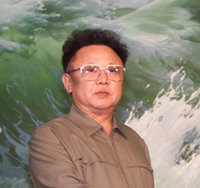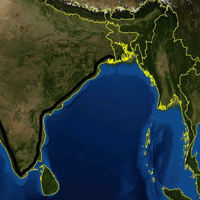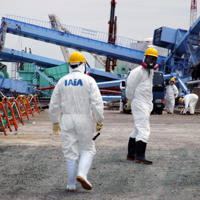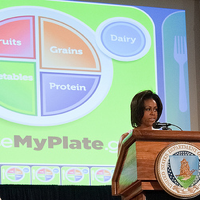The South American free trade zone Mercosur — comprised of Brazil, Argentina, Paraguay and Uruguay, with Venezuela set to join — is often touted as a beacon of regional economic strength and a bulwark against the dominance of the U.S.-backed North American Free Trade Agreement. But a recent protectionist streak in Brazil, Mercosur’s most powerful member, has provoked debate over whether the bloc is as egalitarian and beneficial to South America’s emerging economies as it has long been cracked up to be. The most recent incident is Brazil’s announcement earlier this month that it intends to impose a 30 percent […]
Economics & Business Archive
Free Newsletter

Like many policy issues regarding North Korea, the U.S. has no good options regarding the question of whether or not to resume deliveries of food aid to the isolated country. Last year’s flooding and severe weather have combined with Pyongyang’s perverse policies and rising world food prices to produce major shortfalls in food supplies in many parts of the Democratic People’s Republic of Korea (DPRK). The United States used to be one of North Korea’s major food donors until the deterioration in bilateral relations in 2008-2009 and the refusal by DPRK authorities to allow extensive monitoring of the aid flows […]
Colombia recently signed a deal with South Korea for the development of several oil projects in Colombia. In an email interview, Eric Farnsworth, vice president of the Council of the Americas, discusses Colombia’s oil sector. WPR: What is the current state of Colombia’s oil sector, including extent of reserves and level of infrastructure? Eric Farnsworth: Simply put, Colombia has enjoyed an energy renaissance over the past decade. As noted in a recent Americas Society/Council of the Americas report on Colombia’s energy sector security is vastly improved and successive governments have placed an emphasis on attracting investment through regulatory stability, open […]

After almost 40 years of intermittent and fruitless talks, Bangladesh and Myanmar appear close to a final settlement of their maritime boundary dispute in the Bay of Bengal. Frustrated with stalled negotiations, Bangladesh submitted the case to the International Tribunal for the Law of the Sea (ITLOS) in 2009. After a series of oral hearings in September, which included numerous technical arguments, the court recently adjourned and plans to deliver a ruling in March 2012. The speed with which the case has progressed is in stark contrast to other maritime boundary disputes in Asia, but that is not surprising: There […]
Iran recently joined Russia in expressing concern about negotiations among the European Union, Azerbaijan and Turkmenistan over a proposed trans-Caspian pipeline. In an email interview, Gawdat Bahgat, a political science professor at National Defense University, discussed diplomacy among the Caspian littoral states. WPR: What are the main issues facing the Caspian littoral states in terms of maritime boundaries and resource rights? Gawdat Bahgat: Though the Caspian region does not have the massive proven oil and gas reserves the Persian Gulf region holds, Azerbaijan, Kazakhstan and Turkmenistan have proven themselves as major energy producers and exporters. The intense disagreement over maritime […]

Though they have long existed, NGOs are playing an increasingly significant role in global governance, whether participating in the United Nations system or bringing global concerns to the domestic level. From local to global, NGOs are now an essential aspect of a variety of systems. It has become fashionable to assert that the role of nongovernmental organizations (NGOs) in world politics has grown in importance since the early 1990s. This assertion is true, but not because of the end of the Cold War nor because there is anything new about NGOs exercising influence, as is often claimed. Consider the success […]

The proposed Keystone XL pipeline, which would bring crude oil from the so-called oil sands in Canada’s Alberta province through an almost 2,000-mile pipeline to the U.S. Gulf Coast, has in many ways become ground zero in the U.S. debate over fossil fuels, the environment and climate change. But perhaps most relevant in the current row, though practically absent from the debate, is the increasing awareness that energy security must be included as part of the calculus in determining energy sources. Indeed, terminology such as “friendly” supplier — regularly applied to Canada in U.S. energy discussions — underscores what is […]

As the International Atomic Energy Agency held its Board of Governors meeting and annual General Conference over the past two weeks, the members of this often-overlooked United Nations body found themselves thrust again into the public limelight and burdened with a rapidly expanding agenda. Governments jousted over how to craft new approaches to deal with the aftermath of the nuclear accident at Fukushima, divvy up the agency’s budget and deal with controversial nuclear programs in the Middle East. The debates took place among a membership bitterly divided between those states with advanced nuclear capabilities and those that lack them, divisions […]
China announced earlier this month that it would give $1 billion in preferential loans to Caribbean countries to support economic development. In an email interview, R. Evan Ellis, an assistant professor at the Center for Hemispheric Defense Studies of the National Defense University, discussed China-Caribbean relations. WPR: What is the history of China’s relations with the Caribbean? R. Evan Ellis: China’s relationship with the Caribbean has historically been colored by politics, and in particular the politics of diplomatic recognition. Ideological affinity between mainland China and the new regime in Cuba led Havana to diplomatically recognize the People’s Republic of China […]

The real clash of civilizations in the 21st century will be not over religion, but over food. As the emerging East and surging South achieve appreciable amounts of disposable income, they’re increasingly taking on a Western-style diet. This bodes poorly for the world on multiple levels, with the most-alarmist Cassandras warning about imminent resource wars. But the more immediate and realistic concern is the resulting health costs, which will inevitably trigger a rule-set clash between nanny-state types hell-bent on “reining in” a number of globalized industries — agriculture, food and beverages, restaurants, health care and pharmaceuticals — and those preferring […]
Vietnamese Prime Minister Nguyen Tan Dung recently visited Indonesia, where he and Indonesian President Susilo Bambang Yudhoyono agreed to establish joint patrols of their countries’ maritime border. In an email interview, Donald Weatherbee (.pdf), a professor emeritus at the University of South Carolina, discussed Indonesia-Vietnam relations. WPR: What is the recent history of Indonesia-Vietnam diplomatic, trade and defense relations? Donald Weatherbee: Vietnamese Prime Minister Nguyen Tan Dung’s visit to Indonesia earlier this month was the usual courtesy call by a newly named head of government to his counterparts in the Association of Southeast Asian Nations (ASEAN). Indonesia and a Hanoi-based […]
A World Trade Organization (WTO) panel ruled earlier this year that China was violating its obligations in restricting exports of several raw materials. In an email interview, Terence Stewart, an expert in international trade law at the law firm Stewart and Stewart, discussed China’s compliance with its WTO obligations. WPR: What has been China’s track record on compliance with its WTO obligations since its accession in 2001? Terence Stewart: China’s accession to the WTO has been a great experiment for the global trading system. Many of China’s obligations were phased in, so not all obligations were in place by late-2001. […]
Japan recently moved to provide aid to the rail sector in Bangladesh, with as much as $1.7 billion in infrastructure funds under discussion. In an email interview, Purnendra Jain, a professor at the University of Adelaide’s Center for Asian Studies, discussed Japan-South Asia relations. WPR: What is the state of Japan’s relations with South Asian countries, and who are its major interlocutors? Purnendra Jain: Japan’s overall relations with the South Asian nations have had a rather low profile throughout the postwar period. Japan became a lead supplier of official development assistance (ODA) to a number of countries — such as […]
